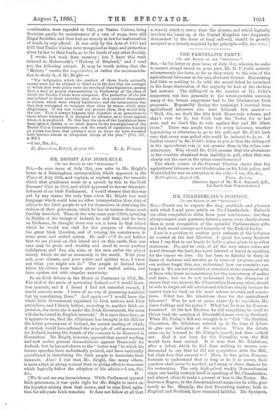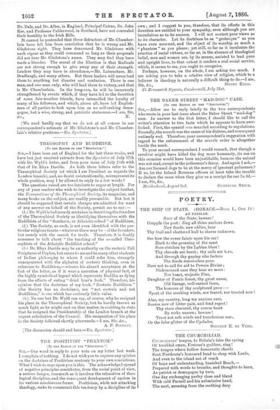MR. CHAMBERLAIN'S POSITION.
[To THE EDITOR OF THE " SPECTATOR.") Sin,—Permit me to express the deep gratitude and pleasure with which I read your article on Mr. Chamberlain. Radicals are often compelled to differ from your conclusions ; but they always respect your generous fairness, never more clearly shown than in your recognition of the splendid Parliamentary gifts and high moral courage and integrity of the Radical leader.
I am in a position to confirm your estimate of the influence he exerted at the last Election. I speak for many Radicals when I say that in our hearts he holds a place given to no other statesman. He, and he only, of all the men whose voices are heard through the land, has never faltered or feared in speaking for the causes we love. Ha has been as faithful to them in times of darkness and reaction as in times of progress, and we can neither forget this, nor understand how our comrades can forget it. We are not troubled or surprised at the maniacal spite of those who knew no consistency but the consistency of malice and hate; but we do not understand how the champion of causes that owe more to Mr. Chamberlain than any other, should be able to forget all old services and relations simply because he cannot turn his back on his most solemn avowals and convic- tions. What has Mr. Gladstone done for the agricultural labourer ? Was he not at pains expressly to repudiate Mr. Jesse Collings and his policy ? What has he done for Noncon- formists? At the last Election he did everything he could to thrust back the question of Disestablishment even in Scotland. When Mr. Finlay's Bill was brought in to " dish " the Scottish Dissenters, Mr. Gladstone refused up to the time of debate to give any indication of his opinion. When the debate came on, he listened to Mr. Finlay's speech, and then walked out. Had it not been for the Parnellite vote, the Bill would have been carried. It is true that Mr. Gladstone, after a defeat which he had done nothing to secure, con- descended to say that he did not sympathise with the Bill ; but what does that amount to ? More, he has given Noncon- formists to understand that so long as be is in power, their question shall never be touched, and many of them clamour for his restoration. The only high-priced weekly Nonconformist organ can hardly restrain itself in speaking of Mr. Chamberlain, and almost offers to make a present of him to the Tories. Mr. Guinness Rogers, in the denominational magazine he edits, goes nearly as far. Happily, the best Dissenting leaders, both in England and Scotland, have remained faithful. Mr. Spurgeon,
Dr. Dale, and Dr. Allen, in England, Principal Cairns, Dr. John Ker, and Professor Calderwood, in Scotland, have not concealed their hostility to the Irish Bills.
It cannot be pretended that these detractors of Mr. Chamber- lain have left him from conviction that he is wrong and Mr. Gladstone right. They have denounced Mr. Gladstone with such vigour as they could command so long as their proposals did not bear Mr. Gladstone's name. They may find they have made a blunder. The moral of the Election is that Radicals are not strong enough to give away any of their strength. Leaders they may have in abundance,—Mr. Labouchere, Mr. Bradlaugh, and many others. But these leaders will never lead them to anything but disaster and confusion. There is one man, and one man only, who will lead them to victory, and that is Mr. Chamberlain. In the long-run, he will be immensely strengthened by events which, if they have led to the desertion of some fair-weather friends, have intensified the loyalty of many of his followers, and which, above all, have led English- men of all parties to look upon him as no self-seeking dema- gogue, but a wise, strong, and patriotic statesman.—I am, Sir, N.
[We need hardly say that we do not at all concur in our correspondent's estimate of Mr. Gladstone's and Mr. Chamber- lain's relative positions.—En. Spectator.]



































 Previous page
Previous page